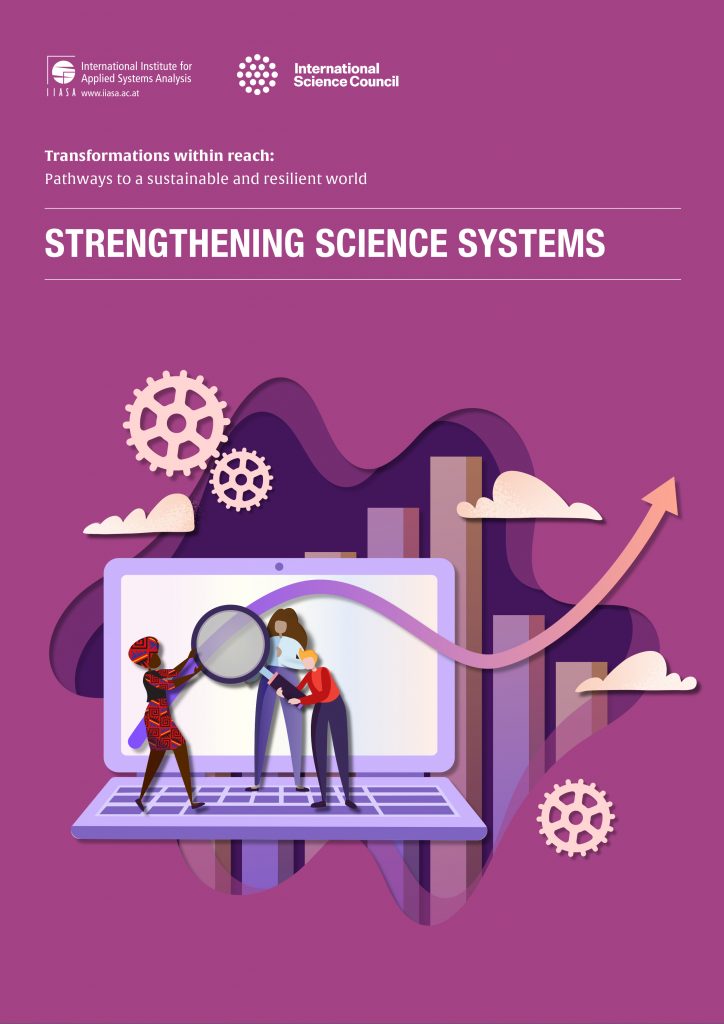
The IIASA-ISC Consultative Science platform has engaged transdisciplinary global thought leaders to produce four reports that focus on a more sustainable pathway to a post COVID-19 world. This blog post looks at the report on Strengthening Science Systems.
Science has spoken reason to power and politics, expanded open science practices, and found a vaccine in record time during this pandemic, yet perceptions of how science has responded overall to the current crisis still vary. There is a broad consensus that there is considerable room for improvement in science systems in the general context of rapidly evolving global exogenous shocks.
“The COVID-19 pandemic is a cautionary tale about the importance and necessity of science: we will face crisis, we know that, and we will best address it through science, but science itself stumbles along and science needs to be more humble, be better educated and not only communicate their knowledge but also communicate the limitation of their knowledge so that science systems can move towards a better frontier.”
– David Kaplan, Senior Research Specialist, ISC
In 2020, IIASA and the International Science Council (ISC) combined their strengths and expertise to define and design sustainability pathways that will help all levels of global governance be better prepared and more resilient in protecting from future systemic shocks.
In these testing times, policymakers and the general public have looked to science for insight, reliable solutions, and actionable advice. The Strengthening Science Systems report addresses how science systems can be better prepared when an inevitable crisis hits again.
The report puts forward a large number of recommendations, grouped under five interrelated major transformative changes:
Strengthen transdisciplinary research and networking on critical risks and systems resilience
As seen with the COVID-19 pandemic, risks can spread globally regardless of their origin. It is in the interests of all countries to work together and provide support to one another. Most notably, developed countries need to help further strengthen scientific capacities with financial support, technology support and technology transfer for developing countries.
On the other hand, while risks may be global, the manner in which they play out and particularly the way in which different societies respond, show considerable variation. Local scientific capacity has the ability to address the local context and develop effective strategies to address risk. This will allow local scientists to put knowledge on disaster risks at the core of disaster risk reduction policies.
Enhance communication of scientific knowledge, public understanding, and trust in science
Trust in science and in the recommendations emanating from scientists are key to the effectiveness of science-based policies. This is especially important as science denial and misinformation have increased during the pandemic. Communication, transparency, and broad public understanding of how science works are three foundations which will enhance trust in science.
Scientists themselves should therefore be incentivized to play a more active role in combating misinformation in their fields, as they are best equipped with the facts. Alongside that, easily accessible sources of scientific results that are simpler for a mass audience to understand should be created in a wider array of languages.
Enhance knowledge diffusion within the science system
Peer-review systems have been shown to be somewhat inadequate in the face of the COVID-19 pandemic. Peer-review systems need to be more agile, international, rigorous, and inclusive in terms of access and avoiding bias if science is to meet the challenges of future crises.
International organizations of science, including the ISC and UNESCO, can take a lead in devising a more effective system of peer review through dialogue with international disciplinary bodies, national academies, publishers, and national research councils.
Increase the capacity of the science system to respond rapidly to crises with high-quality research
Some countries lack adequate disaster research institutions. These institutes cannot be created in a short period of time and need prior infrastructural efforts, so there needs to be ample support and funding of smaller research institutions in advance of possible disasters. Collaborative efforts between big and small research institutes on a global and local scale are highly recommended. Governments also need researchers who can be on standby and they need to allocate funds that are easy to access during a crisis.
Improve the quality and efficacy of science-policy interfaces at national, regional, and global levels
Science advice has moved to center stage when dealing with policies to respond to the COVID-19 pandemic, which has challenged national science–policy systems. Lessons have been learned about how science can become a more effective input into policy. This involves further international scientific cooperation among institutions engaged in science-policy advice, to enhance the quality of science inputs to policy.
International collaboration allows for sharing of evidence and the emergence of a scientific consensus. This consensus can then be communicated to policymakers who, in turn, need to interact more with the wider academic community to systematically review their country’s policies.
These are some of the conclusions from the five lessons on interrelated transformative changes for the science system cited in the report. They show three axes of improvement that are required to ensure that science can react more efficiently to such exogenous shocks: increased agility, enhanced reliability, and a more effective science-policy-society interface. The main overarching objective is to simultaneously improve all three axes, thereby moving science systems to a new frontier.
 © IIASA
© IIASA
Strengthening Science Systems
You can also watch the discussion on Strengthening Science Systems as part of the launch event for the Bouncing Forward Sustainably: Pathways to a post-COVID World, which explores the key themes of Sustainable Energy, Governance for Sustainability, Strengthening Science Systems and Resilient Food Systems.
This blog post was first published on the website of the International Science Council. Read the original article here.
Note: This article gives the views of the author, and not the position of the Nexus blog, nor of the International Institute for Applied Systems Analysis.